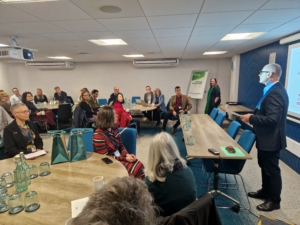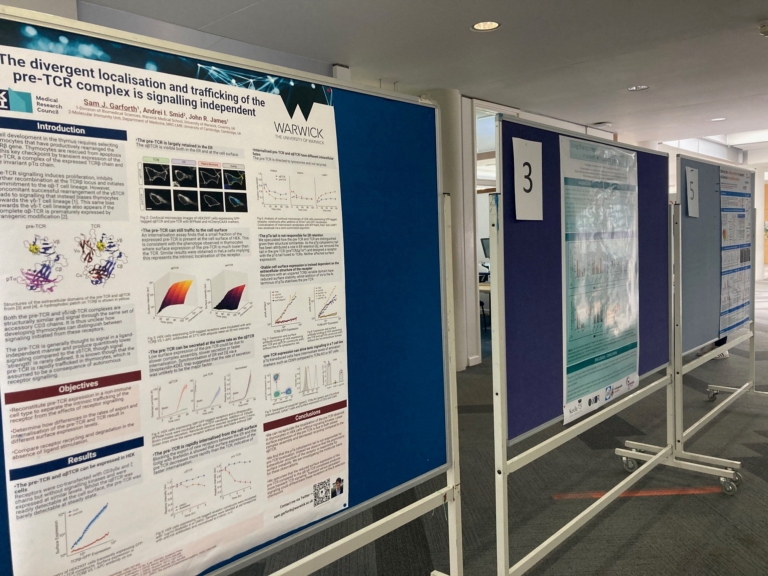This event has now concluded.
Open Research Week 2025 marked a significant milestone as all eight Midlands Innovation partner universities came together for the first time to celebrate and promote open research.
This week-long event brought together researchers and colleagues from across the partnership under the theme “Just for the love of it”, spotlighting open research beyond compliance—focusing on the principles, values, and innovations that drive researchers to embrace openness as a way of working.
Throughout the week, participants explored groundbreaking research, engaged in thought-provoking discussions, and discovered new avenues for collaboration.
You can click on the links below to access downloads of each recorded session, or browse the entire collection here.
Event Details and Recordings
Tuesday 6th May
In recent years there has been vast progress to ensure the replicability, reproducibility, and transparency of psychological research through the implementation of open research practices. Yet, to ensure that these practices become normative and sustained, students – who represent the grassroots of our discipline – need to be trained in them too. In this talk, I will outline the opportunities, challenges, and solutions of embedding a ‘consortium model’ within the undergraduate empirical dissertation. By training students in reproducible big team science, we can further improve the quality of psychological research whilst equipping our students with 21st-century graduate skills.
Wednesday 7th May
Sharing data supporting published findings is crucial for reproducibility. Beyond verification, it enables testing new predictions and exploring unforeseen effects, accelerating research progress. However, on some occasions, ethical concerns may prevent public data sharing, especially when participants’ anonymity is at risk. A solution is synthetic data—mathematically derived datasets that preserve key statistical properties (e.g., variable means, variance-covariance structure) of the original while protecting sensitive information. In this talk, I will introduce synthetic data, demonstrate its applications, and discuss its role in Open Research practices.
Biomedical research has a high rate of replication failure, making the drug and diagnostic development pipelines slow, expensive and risky. In preclinical research, antibodies are an important reagent used to identify proteins, validate drug targets and investigate disease mechanisms. However, they are also a common driver of replication failure, with some antibodies exhibiting poor selectivity for their intended target. To overcome this barrier, we have established an open research collaboration with industry.
Thursday 8th May
This talk will tell the story of Compositor, a database of over 1 million typographic ornaments that were used to decorate the pages of eighteenth-century books. I will describe how open research practices were embedded in the project from its inception ten years ago, and how the values of open research led to new collaborations, and spin-out projects, that might not otherwise have happened. I will also point to how open research practices are shaping the future of the project, and related research.
Preregistration isn’t just a box to tick—it’s a tool that helps us do better science with more confidence. In this talk, I’ll share how preregistration can actually make life easier for researchers. By preregistering studies on OSF, submitting Registered Reports, or using PeerCommunityIn (PCI), we can get early feedback that helps refine our methods before running into problems. It also boosts credibility, reduces the risk of questionable research practices, and can even increase the chances of getting published.
Whilst open research is a key factor of a trusted and transparent research culture, it also has implications on the way we work. A strong research culture is built on similar core principles including collaboration, partnership, and inclusivity. In this session, we will introduce the National Centre for Research Culture (NCRC) based at the University of Warwick, which aims to work collaboratively across the sector to share approaches in the improvement of research culture, and in developing communities of practice to exchange ideas and tested interventions across all areas of research. We will discuss how these core principles have implications and interlinks with open research – including the barriers and opportunities for implementation, and how embracing and modelling these behaviours results in a more dynamic, ethical and collegiate environment.
Friday 9th May
Open research enhances transparency and reproducibility, yet researchers often lack tools to evaluate their own practices. This talk introduces a self-assessment tool designed to help researchers measure and improve their engagement with open research principles, from data sharing to preregistration. I will outline its structure, key features, and practical applications, highlighting how it provides actionable feedback. By integrating self-assessment into research workflows, we can drive a cultural shift toward greater openness and accountability.
For a long time, two aspects of my professional life were disconnected, but no doubt informing each other. Although, I have been a long proponent of open research, I have an older interest (from about 1993) in the open source movement in computing. I will discuss the two fields, and what one can learn from the other.






